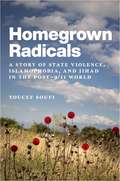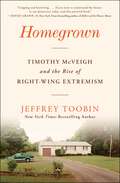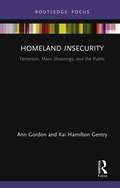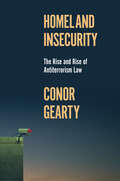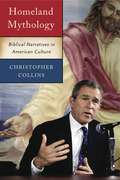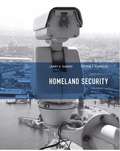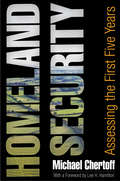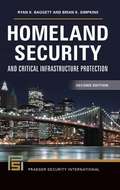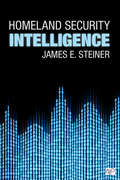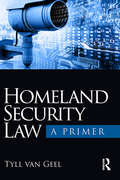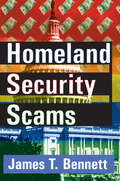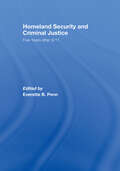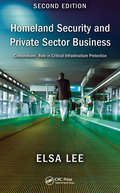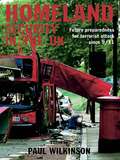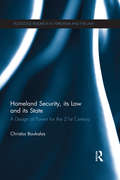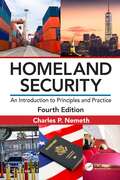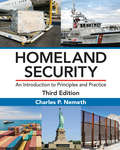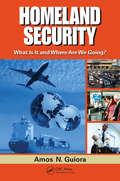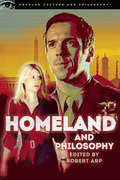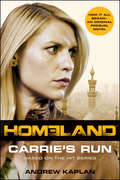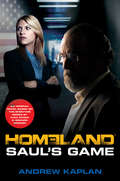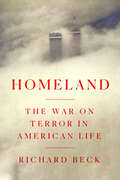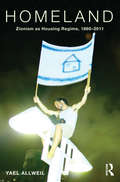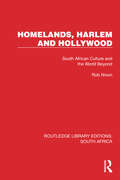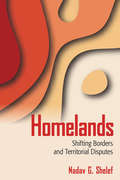- Table View
- List View
Homegrown Radicals: A Story of State Violence, Islamophobia, and Jihad in the Post-9/11 World
by Youcef SoufiThe powerful story of how the War on Terror created the conditions for the emergence of a novel theory of jihadOn March 7th, 2007, three Muslim university students left their small city on the Canadian Prairies, seemingly without a trace. In the ensuing months, their disappearance raised fears among Canadian and US security agencies that the men had become “radicalized,” posing a grave threat to national security. From presidential briefings and targeted drone assassinations to a politically charged trial in a Brooklyn courtroom, the men’s story sheds new light not only on the figure of the “radical,” but also on the “moderate” Muslim, represented by a community forever changed by the men’s departure.Homegrown Radicals offers a case study of the complex entanglements of the radical and moderate Muslim in post-9/11 North America. Youcef Soufi brings these figures together in uneasy tension, providing insight into how state violence has inextricably tied them together. Focusing on the radicalization of the three Muslim students, the book traces the general sense of affective injury among North American Muslims over the loss of Muslim life in Western military campaigns overseas.In this context, a new theory of jihad rooted in a Muslim utopian imagination emerged, marking a significant rupture with premodern Islamic thought. The three “radicals” were among thousands of Anglophone Muslims who found this new theory compelling as both a diagnosis and a solution to the violence unleashed in the War on Terror. The book examines how and why this theory resonated, as well as its consequences for the men’s families, friends, and Muslim community.Homegrown Radicals highlights how post-9/11 Islamophobia has operated through the conceptual blurring of the line between “moderate” and “radical” Muslims, and asks what alternative forms of solidarity may transcend the violent boundaries of the nation-state.
Homegrown: Timothy McVeigh and the Rise of Right-Wing Extremism
by Jeffrey ToobinThe definitive account of the 1995 Oklahoma City bombing and the enduring legacy of Timothy McVeigh, leading to the January 6 insurrection—from acclaimed journalist Jeffrey Toobin.Timothy McVeigh wanted to start a movement. Speaking to his lawyers days after the Oklahoma City bombing, the Gulf War veteran expressed no regrets: killing 168 people was his patriotic duty. He cited the Declaration of Independence from memory: &“Whenever any Form of Government becomes destructive of these ends, it is the Right of the People to alter or to abolish it.&” He had obsessively followed the siege of Waco and seethed at the imposition of President Bill Clinton&’s assault weapons ban. A self-proclaimed white separatist, he abhorred immigration and wanted women to return to traditional roles. As he watched the industrial decline of his native Buffalo, McVeigh longed for when America was great. New York Times bestselling author Jeffrey Toobin traces the dramatic history and profound legacy of Timothy McVeigh, who once declared, &“I believe there is an army out there, ready to rise up, even though I never found it.&” But that doesn&’t mean his army wasn&’t there. With news-breaking reportage, Toobin details how McVeigh&’s principles and tactics have flourished in the decades since his death in 2001, reaching an apotheosis on January 6 when hundreds of rioters stormed the Capitol. Based on nearly a million previously unreleased tapes, photographs, and documents, including detailed communications between McVeigh and his lawyers, as well as interviews with such key figures as Bill Clinton, Homegrown reveals how the story of Timothy McVeigh and the Oklahoma City bombing is not only a powerful retelling of one of the great outrages of our time, but a warning for our future.
Homeland Insecurity: Terrorism, Mass Shootings and the Public (Routledge Research in American Politics and Governance)
by Ann Gordon Kai Hamilton GentryIn this book, Ann Gordon and Kai Hamilton Gentry expertly illuminate how the public has a role to play in ensuring its own security.Recent terror attacks and mass shootings in the United States have added urgency to the need for research on terrorism, the public’s understanding of the precursors of terrorism and public preparedness for mass shootings and acts of terror. Unfortunately, most Americans do not understand what constitutes suspicious behavior or how to report it. Even more alarmingly, the public does not know what to do in the event of terrorist attack or mass casualty incident. Drawing on five years of the Chapman Survey of American Fears (CSAF), a nationally representative survey, and real-world events, Homeland InSecurity offers actionable solutions on how to educate the public to overcome fear and play an active role securing schools, public venues and the homeland itself. The book addresses proposals by survivors and victims’ families to reduce violence through campaigns to deny shooters the notoriety they seek and reduce access to guns. It also explores the rise of activism among survivors of school shootings and their quest to educate the public and end school shootings.Homeland InSecurity will be essential for scholars, students, and policy makers.
Homeland Insecurity: The Rise and Rise of Global Anti-Terrorism Law (History of Violence)
by Conor GeartyIn the decades following the 9/11 attacks, complex webs of anti-terrorism laws have come into play across the world, promising to protect ordinary citizens from bombings, hijackings and other forms of mass violence. But are we really any safer? Has freedom been secured by active deployment of state power, or fatally undermined? In this groundbreaking new book, Conor Gearty unpacks the history of global anti-terrorism law, explaining not only how these regulations came about, but also the untold damage they have wrought upon freedom and human rights. Ranging from the age of colonialism to the Cold War, through the perennial crises in the Middle East to the exponential growth of terrorism discourse compressed into the first two decades of the 21st century, the coercion these laws embody is here to stay. The ‘War on Terror’ was something that colonial and neo-colonial liberal democracies had always been doing—and something that is not going away. Anti-terrorism law no longer requires terrorism to survive. Wide-ranging, elegant and with a perceptive analytical sting, this book is essential reading for anyone seeking to understand the deep origins of terrorism and counter-terrorism, and how these concepts fundamentally shape the world we live in.
Homeland Mythology: Biblical Narratives in American Culture
by Christopher CollinsSince 9/11, America has presented itself to the world as a Christianist culture, no less antimodern and nostalgic for an idealized past than its Islamist foes. The master-narrative both sides share might sound like this: Once upon a time, the values of the righteous community coincided with those of the state. Home and land were harmoniously united under God. But through intellectual pride (read: science) and disobedience (read: human rights), this God-blessed homeland was lost and is now worth every drop of blood it takes, ours and others’, to recover.For Americans, the prime source for this once-and-future-kingdom myth is the Bible, with its many narratives of blessings gained, lost, and regained: the garden of Eden, the covenant with Abraham, the bondage in Egypt, the exodus under Moses, the glory of David and Solomon’s realm, the coming of the promised Messiah, his crucifixion, resurrection, and ascension into heaven, his apocalyptic return at the end of history, and his establishment of the earthly kingdom of God. As Homeland Mythology shows, these biblical narratives have, over time, inspired a multitude of nationalist narratives, myths ingeniously spun out to justify a number of decidedly unchristian policies and institutions—from Indian genocide, the slave trade, and the exploitation of immigrant workers to Manifest Destiny, imperial expansionism, and, most recently, preemptive war.On March 25, 2001, George W. Bush shared a bit of political wisdom: “You can fool some of the people all of the time—and those are the ones you have to concentrate on.” The cynical use of religion to cloak criminal behavior is always worth exposing, but why our leaders lie to us is no longer a mystery. What does remain mysterious is why so many of us are disposed to believe their lies. The unexamined issue that this book addresses is, therefore, not the mendacity of the few, but the credulity of the many.
Homeland Security
by Victor E. Kappeler Larry K. Gaines Victor H. Ascolillo<P>Taking a comprehensive approach, HOMELAND SECURITY provides an overview of homeland security and terrorism. <P>Organized in a four-part format, it examines the foundation for homeland security, homeland security and terrorism, defeating terrorists and their activities, and Homeland Security's response to terrorist threats. <P>Each chapter includes key terms, discussion questions, marginal web links and HS analysis boxes that encourage students to think critically and analyze current problems inherent to homeland security and terrorism.
Homeland Security
by Lee H. Hamilton Michael ChertoffIn 2003, the President and the U.S. Congress established the Department of Homeland Security. From the beginning, its mission was clear: prevent terrorist attacks, protect against threats to America's safety and security, and prepare the nation to respond effectively to disasters, both natural and man-made. This monumental mission demands a comprehensive strategy. It also requires a crystal-clear explanation of that strategy to Americans and their allies worldwide. In a revealing new book, Homeland Security: Assessing the First Five Years, Michael Chertoff provides that explanation. In a refreshingly candid and engaging manner, America's former homeland security secretary depicts the department's long-term approach, what it has achieved, and what it has yet to do.The strategy begins with the threats America faces, from terrorist groups like al Qaeda to hurricanes like Ike or Gustav. "Once these threats are identified," Chertoff writes, "we can confront them, using every tool at our disposal. We can stop terrorists from entering the country, and discourage people from embracing terrorism by combating its lethal ideology. We can protect our critical assets and reduce our vulnerabilities to natural disasters. We can plan and prepare for emergencies and respond in a way that minimizes the consequences. And we can work closely with our allies abroad to reduce the risk of future disasters." In each of these areas, Chertoff informs the reader what the nation has done and what it still must do to secure its future.How well has this strategy fared in a post-9/11 world? Since that fateful day, there have been no global terror attacks on American soil. Yet in the face of continued dangers, Michael Chertoff warns repeatedly against complacency. He urges America and its leaders to strengthen their resolve, stay the course, and build creatively on past successes.
Homeland Security And Critical Infrastructure Protection, 2nd Edition (Praeger Security International)
by Ryan K. Baggett Brian K. SimpkinsIn the second edition of this text, we would like to thank Dr. Pam Collins (EKU Retired Professor of Homeland Security) for her work as a coauthor on the first edition. Additionally, we would like to thank Ms. Kayla E. Matola (Critical Infrastructure Analyst with the Kentucky Office of Homeland Security) for writing Chapter 14 from a practitioner's perspective.
Homeland Security Intelligence
by James E. SteinerHomeland Security Intelligence is the first single-authored, comprehensive treatment of intelligence. It is geared toward the full range of homeland security practitioners, which includes hundreds of thousands of state and local government and private sector practitioners who are still exploring how intelligence can act as a force multiplier in helping them achieve their goals. With a focus on counterterrorism and cyber-security, author James E. Steiner provides a thorough and in-depth picture of why intelligence is so crucial to homeland security missions, who provides intelligence support to which homeland security customer, and how intelligence products differ depending on the customer’s specific needs and duties.
Homeland Security Law: A Primer
by Tyll van GeelSince 2001 the U.S. government has been engaged in the delicate balancing act of seeking to protect the country against terrorism, both foreign-connected and wholly domestic, while taking into account a number of constitutional protections that can all too easily be trammelled in the effort to assure domestic security. At the same time the development of these policies has created significant constitutional tension among the three branches of the federal government, especially when the President vigorously asserts claims of sweeping power as commander-in-chief in such a way as to raise warnings about the emergence of an imperial presidency. Simultaneously, the rule of law has been placed under stress as the technological prowess of the government has grown. This book addresses these topics in an accessible manner, covering the key developments of domestic security law related to terrorism. Tyll van Geel covers the essential elements of homeland security law including: branches of government and institutions involved in counterterrorism law; border control and immigration; surveillance; the searching of computers and cell phones; the prosecution of terrorists for any number of crimes, including cyberterrorism; military detention; the prosecution of unprivileged enemy belligerents in military commissions; and habeas corpus. The book is designed to offer a clear guide to current issues in domestic security in response to terrorism and will be a valuable guide for concerned citizens as well as undergraduate students studying domestic politics or national security.
Homeland Security Scams
by James T. BennettA direct consequence of the War on Terror launched after the attacks of September 11, 2001 is an awareness of the need for homeland security. This war is being used to justify a huge expansion of government powers and spending, but funds allocated for homeland security are often for programs far removed from anything that might be termed defense or security. In Homeland Security Scams, James T. Bennett shows that this government spending is doing very little to make us safer, but a great deal to make us poorer, less free, and more dependent on the federal government.Regardless of the color of the security alert issued by the Homeland Security czar, the spending light is always green as pork barrel dollars are showered on programs of dubious worth. Lobbyists lobby for homeland security grants and contracts; corporations and state and local governments are becoming ever more dependent on federal subsidies; the vested interest in prolonging and intensifying the concern about homeland security increases; and lobbyists press for ever more money. As Bennett makes clear, with government money comes government control. Law enforcement and emergency response agencies at all levels of government are being effectively nationalized. Police power is being concentrated, and the Department of Homeland Security (DHS) envisions a surveillance state that the East German State Police under Communism would have envied.In this hard-hitting critique, Bennett argues that all the spending and surveillance will not win the War on Terror or preserve us from natural disasters. The foe cannot be beaten (we're having trouble even finding the enemy), cannot surrender, and still has awesome powers to lay waste to American cities and citizens. He argues that we should view terrorism as just one of many other serious threats to individuals and to nations. More sternly, he warns that the War on Terror is also a War on Privacy and a War on Liberty.
Homeland Security and Criminal Justice: Five Years After 9/11
by Everette B. PennNo event has shaped international events of recent years more than the terrorist attacks of September 11, 2001. Tragically, less than four years later, Hurricane Katrina devastated the Gulf Coast. In less than five years, the United States has experienced its worst terrorist attack and worst natural disaster, both in terms of the number of lives lost and in the costs needed for reconstruction. Both events have clearly indicated that there are tremendous threats to the security and well-being of Americans in their own country. Furthermore, these events have demonstrated the importance of criminal-justice agencies who are the first responders to threats to the United States. Since the threats of further terrorist attacks, natural disasters, epidemics, and cybercrime continue to lurk as potential dangers to the United States homeland, the American Criminal Justice System must be committed to mitigating, preparing for, responding to, and recovering from these tragic events. In addition, its commitment must be steadfast and ubiquitous. This highly topical book analyzes the nexus of homeland security to the discipline of criminal justice by addressing, in depth, issues and challenges facing criminal-justice students, practitioners, and faculty in the burgeoning field of homeland security.This book was previously published as a special issue of Criminal Justice Studies.
Homeland Security and Private Sector Business: Corporations' Role in Critical Infrastructure Protection, Second Edition
by Chi-Jen Lee Cheng-Hsiung Lu Lucia H. LeeAddressing mandates and legislation introduced since the first edition, this new edition of an essential text identifies the role the private sector plays in securing our homeland and offers strategies to aid in the fight against national and international threats. It includes updates to the NIPP (National Infrastructure Protection Plan), new case studies of both proper security policies and procedures in practice versus costly security breaches, a toolkit for improving a company‘s security posture, and new measures to assess and address vulnerabilities and threats.
Homeland Security in the UK: Future Preparedness for Terrorist Attack since 9/11 (Political Violence)
by Paul WilkinsonThis book is a detailed examination of whether domestic security measures are striking an appropriate balance between homeland security and civil liberties in the post-9/11 era. Professor Paul Wilkinson and the other contributors assess the nature of UK responses to terrorism by key public and private-sector bodies, highlighting how these organizations can prevent, pre-empt, counter and manage terrorist attacks by using a matrix of factors such as types of terrorist networks, tactics and targets. The volume also compares and contrasts the UK's response with cognate states elsewhere in the EU and with the USA. While improved intelligence has helped prevent a major Al Qaeda attack, the authors conclude that there is still a ‘major question mark’ over whether the country is adequately resourced to deal with an emergency situation, particularly in major cities other than London. The book also confirms that while the UK faces a ‘real and serious’ threat of terrorist attack by Al Qaeda, it is better prepared for an attack than other EU member states. Homeland Security in the UK will be essential reading for all students of terrorism studies, security studies and politics, as well as by professional practitioners and well-informed general readers.
Homeland Security, its Law and its State: A Design of Power for the 21st Century (Routledge Research in Terrorism and the Law)
by Christos BoukalasThis book assesses the impact of post-9/11 domestic counterterrorism policy on US political life. It examines political discourse, law, institutional architecture, and state-population relations, and shows that ‘homeland security’ is a project with wide-ranging implications for democratic institutions and culture. These implications are addressed through a novel approach that treats law and the state as social relations, and relates developments in law to those in the state and in social dynamics. On this basis, the book examines the new political representations in counterterrorism discourse, especially regarding the relation between the state and the population. It examines the form and content of counterterrorism law, the powers it provides, and the structure and functions it prescribes for the state. By focusing on the new Department of Homeland Security and the restructuring of the intelligence apparatus, the book assesses the new, intelligence-led, policing model. Finally, it examines forms of popular support and resistance to homeland security, to discuss citizenship and state-population relations. The author concludes that homeland security has turned the US into a hybrid polity; the legal and political institutions of democracy remain intact, but their content and practices become authoritarian and exclude the population from politics. These legal and political forms remain operative beyond counterterrorism, in the context of the present economic crisis. They are a permanent configuration of power. This book is an indispensable companion for students of (counter-) Terrorism and Security Studies, Politics, Human Rights, Constitutional and Criminal Law, American Studies, and Criminology.
Homeland Security: An Introduction to Principles and Practice
by Charles P. NemethHomeland Security: An Introduction to Principles and Practice, Fourth Edition continues its record of providing a fully updated, no-nonsense textbook to reflect the latest policy, operational, and program changes to the Department of Homeland Security (DHS) over the last several years. The blend of theory with practical application instructs students on how to understand the need to reconcile policy and operational philosophy with the real-world use of technologies and implementation of practices. The new edition is completely updated to reflect changes to both new challenges and continually changing considerations. This includes facial recognition, intelligence gathering techniques, information sharing databases, white supremacy, domestic terrorism and lone wolf actors, border security and immigration, the use of drones and surveillance technology, cybersecurity, the status of ISIS and Al Qaeda, the increased nuclear threat, COVID-19, ICE, DACA, and immigration policy challenges. Consideration of, and the coordinated response, to all these and more is housed among a myriad of federal agencies and departments. Features • Provides the latest organizational changes, restructures, and policy developments in DHS • Outlines the role of multi-jurisdictional agencies—this includes stakeholders at all levels of government relative to the various intelligence community, law enforcement, emergency managers, and private sector agencies • Presents a balanced approach to the challenges the federal and state government agencies are faced with in emergency planning and preparedness, countering terrorism, and critical infrastructure protection • Includes full regulatory and oversight legislation passed since the last edition, as well as updates on the global terrorism landscape and prominent terrorist incidents, both domestic and international • Highlights emerging, oftentimes controversial, topics such as the use of drones, border security and immigration, surveillance technologies, and pandemic planning and response • Contains extensive pedagogy including learning objectives, sidebar boxes, chapter summaries, end of chapter questions, Web links, and references for ease in comprehension Homeland Security, Fourth Edition continues to serve as the comprehensive and authoritative text on homeland secuirty. The book presents the various DHS state and federal agencies and entities within the government—their role, how they operate, their structure, and how they interact with other agencies—to protect U.S. domestic interests from various dynamic threats. Ancillaries including an Instructor's Manual with Test Bank and chapter PowerPointTM slides for classroom presentation are also available for this book and can be provided for qualified course instructors. Charles P. Nemeth is a recognized expert in homeland security and a leader in the private security industry, private sector justice, and homeland security education. He has more than 45 book publications and is currently Chair of the Department of Security, Fire, and Emergency Management at John Jay College in New York City.
Homeland Security: An Introduction to Principles and Practice, Third Edition
by Charles P. NemethSince formed in 2002, DHS has been at the forefront of determining and furthering some of the most hotly debated security issues facing the U.S. and global community in the 21st century. Nearly 200 university programs with undergrad and graduate majors have cropped up in the last dozen-plus years with limited resources available to teach from. Homeland Security, Third Edition will continue to serve as the core textbook covering the fundamental history, formation, oversight, and reach of DHS currently. The book is fully updated with new laws, regulations and strategies across intelligence, transportation sectors, emergency management, border security, public utilities and public health.
Homeland Security: What Is It and Where Are We Going?
by Amos N. GuioraWith the ten-year anniversary of 9/11 now behind us, one critical question persists. Have policies enacted to protect us from terrorist attacks actually made us safer, or have they merely mollified the concerned public with a false sense of security? Homeland Security: What Is It and Where We Are Going combines professional experiences, personal re
Homeland and Philosophy
by Robert ArpIn Homeland and Philosophy, 23 philosophers tackle the issues that Showtime's award winning show, Homeland, asks us to consider. The show, which centers on Marine Sergeant Nicholas Brody's release from an al-Qaeda prison, and CIA Agent Carrie Mathison's distrust of his intentions, asks questions of identity, what it means to be a terrorist, the conditions and effects of brainwashing, lying for the greater good, and whether or not courage is a virtue.But these questions are only a few among many that are explored in the shadowy spy-filled world of Homeland. Through the lenses of Rawls, Kant, Arendt, Foucault, Heidegger, Sartre, and Kierkegaard, among others, Homeland and Philosophy considers the ethics of drone warfare; whether or not Carrie Mathison's personality changes and psychological disorder make her an interesting character study in the metaphysics of personhood; at what point is privacy only an illusion; and concepts of torture, punishment, and discipline.Nicholas Brody is a Marine, a terrorist, a double agent, a congressman, a father, a husband, a lover, and a friend...but who is Nicholas Brody?
Homeland: Carrie's Run
by Andrew KaplanAn edge-of-your-seat original prequel based on Showtimes hit series HomelandBeirut, 2006. CIA operations officer Carrie Mathison barely escapes an ambush while attempting a clandestine meeting with a new contact, code-name Nightingale. Suspicious that security has been compromised, she challenges the station chief in a heated confrontation that gets her booted back to Langley. Expert in recognizing and anticipating behavioral patterns--a skill enhanced by her bipolar disorder she keeps secret to protect her career--Carrie is increasingly certain that a terrorist plot has been set in motion. She risks a shocking act of insubordination that helps her uncover secret evidence connecting Nightingale with Abu Nazir, the leader of Al Qaeda in Iraq. Determined to stop the terrorist mastermind, she embarks on an obsessive quest that will nearly destroy her. Filled with the suspense and plot twists that have made Homeland a must-watch series, this riveting tale reveals the compelling untold backstories of the series main characters and takes fans deeper into the life and mind of one brilliant female spy.
Homeland: Saul's Game
by Andrew KaplanA rip-roaring original prequel novel based on Showtime's Award-winning hit series HomelandDamascus, Syria, 2009. Carrie Mathison is leading an operation to capture or kill al-Qaeda terrorist Abu Nazir. But arriving at the compound where he was supposed to be in hiding, her team finds it empty. Carrie is sure that someone is leaking CIA information to the enemy and has betrayed their operation, seriously threatening American interests in the Middle East. To expose the double agent, her boss, Saul Berenson, devises an elaborate ruse that will send her on the most dangerous mission of her life.This twisting tale of international intrigue takes fans deeper into the intense world of high-stakes espionage and explores never-before-seen details of Carrie's life as an operative in the Middle East, Saul's past as an agent in Iran, Brody's dark childhood and captivity, and events involving the trio--and other favorite characters like Dar Adal--that will lead them to the present.and events involving the trio--and other favorite characters, like Dar Adal--that will lead them to the present.
Homeland: The War on Terror in American Life
by Richard BeckA groundbreaking history of how the decades-long war on terror changed virtually every aspect of American life, from the erosion of citizenship down to the cars we bought and TV we watched—by an acclaimed n+1 writer&“Richard Beck, like many people alive today, has spent his adult life living in the shadow of 9/11, and Homeland is a devastating inquiry into the new world that day created.&”—Greg Grandin, Pulitzer Prize–winning author of The End of the Myth: From the Frontier to the Border Wall in the Mind of AmericaFor twenty years after September 11, the war on terror was simultaneously everywhere and nowhere. With all of the military violence occurring overseas even as the threat of sudden mass death permeated life at home, Americans found themselves living in two worlds at the same time. In one of them, soldiers fought overseas so that nothing at home would have to change at all. In the other, life in the United States took on all kinds of unfamiliar shapes, changing people&’s sense of themselves, their neighbors, and the strangers they sat next to on airplanes. In Homeland, Richard Beck delivers a gripping exploration of how much the war changed life in the United States and explains why there is no going back. Though much has been made of the damage that Donald Trump did to the American political system, Beck argues that it was the war on terror that made Trump&’s presidency possible, fueling and exacerbating a series of crises that all came to a head with his rise to power. Homeland brilliantly isolates and explores four key issues: the militarism that swept through American politics and culture; the racism and xenophobia that boiled over in much of the country; an economic crisis that, Beck convincingly argues, connects the endurance of the war on terror to at least the end of the Second World War; and a lack of accountability that produced our &“impunity culture&”—the government-wide inability or refusal to face consequences that has transformed how the U.S. government relates to the people it governs. To see American life through the lens of Homeland&’s sweeping argument is to understand the roots of our current condition. In its startling analysis of how the war on terror hollowed out the very idea of citizenship in the United States, Beck gives the most compelling explanation yet offered for the ongoing disintegration of America&’s social, political, and cultural fabric.
Homeland: Zionism as Housing Regime, 1860–2011 (Planning, History and Environment Series)
by Yael AllweilOn 29 March 2016 the New York based online journal, Realty Today reported ‘Israel is facing a housing crisis with …[the] home inventory lacking 100,000 apartments… House prices, which have more than doubled in less than a decade, resulted in a mass protest back in 2011’. As Yael Allweil reveals in her fascinating book, housing has played a pivotal role in the history of nationalism and nation building in Israel-Palestine. She adopts the concept of ‘homeland’ to highlight how land and housing are central to both Zionism and Palestinian nationalism, and how the history of Zionist and Palestinian national housing have been inseparably intertwined from the introduction of the Ottoman Land Code in 1858 to the present day. Following the Introduction, Part I, ‘Historiographies of Land Reform and Nationalism’, discusses the formation of nationalism as the direct result of the Ottoman land code of 1858. Part II, ‘Housing as Proto-Nationalism’ focuses on housing as the means to claim rights over the homeland. Part III, ‘Housing and Nation-Building in the Age of State Sovereignty’, explores the effects of statehood on national housing across several strata of Israeli society. The Afterword discusses housing as the quintessential object of agonistic conflict in Israel-Palestine, around which the Israeli polity is formed and reformed.
Homelands, Harlem and Hollywood: South African Culture and the World Beyond (Routledge Library Editions: South Africa #15)
by Rob NixonOriginally published in 1994, Homelands, Harlem & Hollywood examines the anti-colonialist struggle against apartheid, and the ways in which American and South African culture have been fascinated with and influenced by one another. Rob Nixon’s wide-ranging analysis looks at Hollywood representations of the struggle for liberation, the impact of the Harlem Renaissance on the Sophiatown writers, the banning and censorship of television under apartheid, Mandela and messianic politics, the sports and cultural boycotts, ethnic nationalism, and the culture of violence. Nixon concludes with an investigation of how the collapse of communism and anti-communism and the rise of ethnic cleansing in Eastern Europe and the former Soviet Union had powerful implications for the shape of post-apartheid South Africa.
Homelands: Shifting Borders and Territorial Disputes
by Nadav G. ShelefWhy are some territorial partitions accepted as the appropriate borders of a nation's homeland, whereas in other places conflict continues despite or even because of division of territory? In Homelands, Nadav G. Shelef develops a theory of what homelands are that acknowledges both their importance in domestic and international politics and their change over time. These changes, he argues, driven by domestic political competition and help explain the variation in whether partitions resolve conflict.Homelands also provides systematic, comparable data about the homeland status of lost territory over time that allow it to bridge the persistent gap between constructivist theories of nationalism and positivist empirical analyses of international relations.
